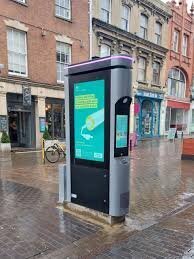Smart Tourism Information Kiosks leverage advanced technologies, particularly artificial intelligence (AI), to enhance the travel experience by providing real-time information and personalized recommendations to tourists. These interactive kiosks are becoming increasingly prevalent in tourist destinations, airports, and public spaces, offering a range of functionalities that cater to the needs of modern travelers.
AI-Driven Recommendations
AI technology enables kiosks to analyze user preferences and behaviors, delivering tailored suggestions for attractions, dining, and activities. By utilizing data from previous interactions and real-time analytics, these kiosks can provide personalized itineraries and recommendations, enhancing the overall travel experience. For example, a tourist might receive suggestions for nearby restaurants based on their dietary preferences or interests in local cuisine[1][2].
Touchless Interaction
In response to health and safety concerns, many kiosks now feature touchless interfaces, such as voice recognition and gesture controls. This technology allows users to interact with the kiosks without physical contact, promoting hygiene and safety. Tourists can access information and services simply by speaking or using hand gestures, making the experience more convenient and accessible[1][5].
Immersive Experiences
Some smart kiosks are equipped with virtual reality (VR) capabilities, allowing users to explore attractions virtually before visiting them. This feature not only aids in planning but also enhances engagement by providing immersive previews of experiences. Tourists can take virtual tours of museums, parks, or historical sites, helping them make informed decisions about their itineraries[1][2].
Multilingual Support
To cater to a diverse range of visitors, many kiosks offer multilingual support, breaking down language barriers. This feature is particularly beneficial in tourist-heavy cities, where visitors from various linguistic backgrounds may seek information. By providing translations and localized content, these kiosks ensure that all tourists can access essential information effortlessly[4][5].
Data Analytics and Insights
Smart kiosks also collect valuable data on user interactions, preferences, and foot traffic. This information can be analyzed to improve services and enhance the tourist experience further. For instance, businesses can use insights gained from kiosk interactions to optimize their offerings and marketing strategies, ultimately driving engagement and revenue[2][3].
Conclusion
Smart Tourism Information Kiosks represent a significant advancement in how tourists access information and plan their experiences. By integrating AI technology, touchless interfaces, and immersive features, these kiosks not only enhance convenience and personalization but also contribute to a safer and more engaging travel environment. As technology continues to evolve, the potential for these kiosks to transform the tourism landscape is substantial, promising a future where travel experiences are more tailored and accessible than ever before[1][2][3].
Further Reading
1. https://about.hootboard.com/interactive-screens/the-future-of-interactive-tourism-emerging-technologies-in-digital-kiosks/
2. The Digital Kiosks of Tomorrow: How AI and Interactive Media are Elevating the Customer Experience
3. Integration With AI Facial Recognition Tech – Smart AI Kiosk – V-Series
4. Smart Cities World – Inclusivity – Seoul deploys multilingual interactive translation kiosks
5. From Stations to Exhibits: Enhancing Public Spaces with AI Voice Technology


